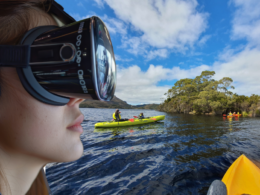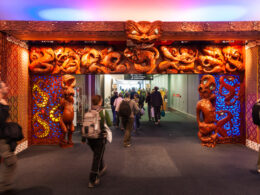In this second episode of Checking In, I reflect on Air New Zealand’s recent abandonment of its science-based targets. This has been an embarrassing and uncomfortable announcement for the country’s flagship carrier to make, after putting a lot of emphasis on the importance of climate leadership and action in recent years. So in this episode, I comment on the background to Air New Zealand’s previous commitments and consider how the airline might navigate its climate impacts into the future.
Useful links
- Air New Zealand’s (now under review) Flight NZ0 website: https://flightnz0.airnewzealand.co.nz
- The aeromasculinities paper mentioned in this episode: https://www.sciencedirect.com/science/article/pii/S2214629623003791
- Jonathan Porritt’s perspective on Air New Zealand’s announcement, from his blog: https://jonathonporritt.com/air-new-zealand-a-climate-leader-no-more/
- One of many news articles, this from the BBC, about the announcement: https://www.bbc.com/news/articles/czrjzvep41ro
You can read the full transcript of this episode below:
On Tuesday 30 July Air New Zealand scrapped its 2030 climate targets and withdrew from the Science Based Targets Initiative.
This initiative was intended as a commitment to outlining emissions reduction plans to 2030. The targets are aligned with the climate science that states that we must limit temperature rise to well below 2°C compared to pre-industrial levels.
This initiative makes it clear that climate action requires both near-term and long-term targets, and that we can not achieve our net zero 2050 aspirations without achieving interim 2030 targets along the way.
In fact Air New Zealand’s targets were based on emissions intensity – which aims to reduce emissions per revenue passenger kilometre – that is the energy required to move one passenger one kilometre. This is different from actually reducing emissions. Gains in efficiency are important – but in aviation they have been historically overwhelmed by demand growth.
The problem is that efficiency can be very misleading. Despite new aircraft being more energy efficient that previous generations of aircraft, Air New Zealand’s emissions intensity per passenger kilometre has been shown to have increased since 2010 despite operating very efficient new generation aircraft. This is because of increased space and comfort onboard. Unfortunately more premium economy, more business class and sky nests translates into increased emissions intensity per passenger.
This has been called the ‘efficiency trick’ because airlines can sell emissions efficiency improvements as a good news story. But increasing efficiency and growth in passenger numbers still results in increasing gross emissions.
****
Air New Zealand’s abandonment of its science-based targets has obviously come as a major blow.
Air New Zealand had set itself apart from most airlines globally due to its genuine commitment to sustainability. It established a Sustainability Advisory Panel about a decade ago and assembled a highly respected set of panel members.
Chaired by Sir Jonathan Porritt, it set about tackling aviation’s multiple sustainability challenges. In doing so it confronted a set of enormous challenges relating to emissions, while facing the unenviable reality of limited opportunities for technical breakthrough. This itself was world leading and highly creditworthy.
In confronting these challenges Air New Zealand was refreshing in its honesty. Porritt pointed to the scale of the challenge when he described Air New Zealand as the “world’s least unsustainable airline”.
In the 2017 Air New Zealand sustainability report he stated that: “the dilemma for anyone who cares passionately about addressing the multiple threats of climate change: either stop flying altogether or fly as little and as discriminatingly and responsibly as possible”. No airline in the world has been so honest, before or since.
Air New Zealand’s sustainability commitment became central to its brand and made Kiwis proud.
It also served as a model for other airlines to aspire to.
Air New Zealand’s commitment was to carbon offsetting, Sustainable Aviation Fuels, and alternative fuels including short haul electric and investment in the possibility of hydrogen. All of which are problematic.
It gave expression to its commitment by launching an advertising campaign trademarked Flight NZ0. Not NZ1, it’s famous AKL-LAX route, but NZ0 – short for Net Zero. This campaign showcased Air New Zealand’s commitments to net zero emissions, and – with the benefit of hindsight – perhaps rather cynically used young children to front the campaign – thanking Air New Zealand for safeguarding their futures from climate disaster.
Simultaneously Air New Zealand introduced NZ2 its marquee flight from AKL-NYC – one of the longest and most fuel hungry flights anywhere in the world.
The Flight NZ0 website has now been taken down, replaced with a message stating that “This site is currently under review.”
So now Air New Zealand’s commitment to climate action is in deep question.
The problems, apparently, are the availability and affordability of new aircraft and sustainable aviation fuels (SAFs).
The sad reality is that Air New Zealand has no replacement plan.
One can only imagine how the members of Air New Zealand’s Sustainability Advisory Panel must now feel. Those feelings may be reflected in Sir Jonathon Porritt’s recent blog comments in which he expresses the view that climate change and the airline industry are both out of control. He goes on to say:
– The aviation industry’s leadership is abysmal;
– Growth obsessed clones of their growth obsessed predecessors and
– …a ramshackle bunch of big egos – a comment that is reflected in a recent paper on Aeromasculities lead by Debbie Hopkins at Oxford and published in the journal Energy Research and Social Science in 2023.
Tellingly, Porritt states that “airlines are required to (theoretically) demonstrate their pathways to net zero 2050 but most are either making it up or lying through their teeth.
The chickens have come home to roost now because airlines have cornered themselves and have in some cases become the target of greenwashing climate litigation cases.
So where now from here?
Air New Zealand apparently remains committed to the 2050 net zero target.
It has promised to make further announcements on its revised plans for 2050.
That will be an interesting announcement, given that “lying through their teeth” is no longer an option.
In the meantime Air New Zealand is a sustainability leader no more.
Rather, according to Porritt, it is “just one more growth-obsessed, volume-driven airline hoping to blank out the climate crisis”.
We should all feel sorry about this regrettable course of events.
But perhaps the ones that we should feel most sorry for are the children in the Flight NZ0 advertising campaign.








